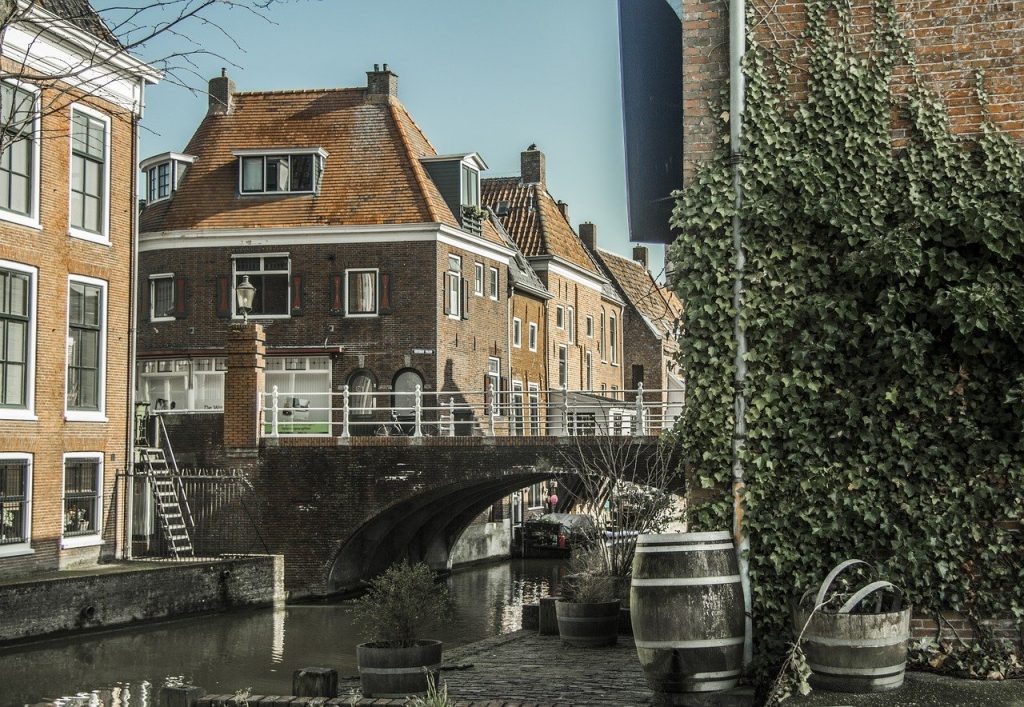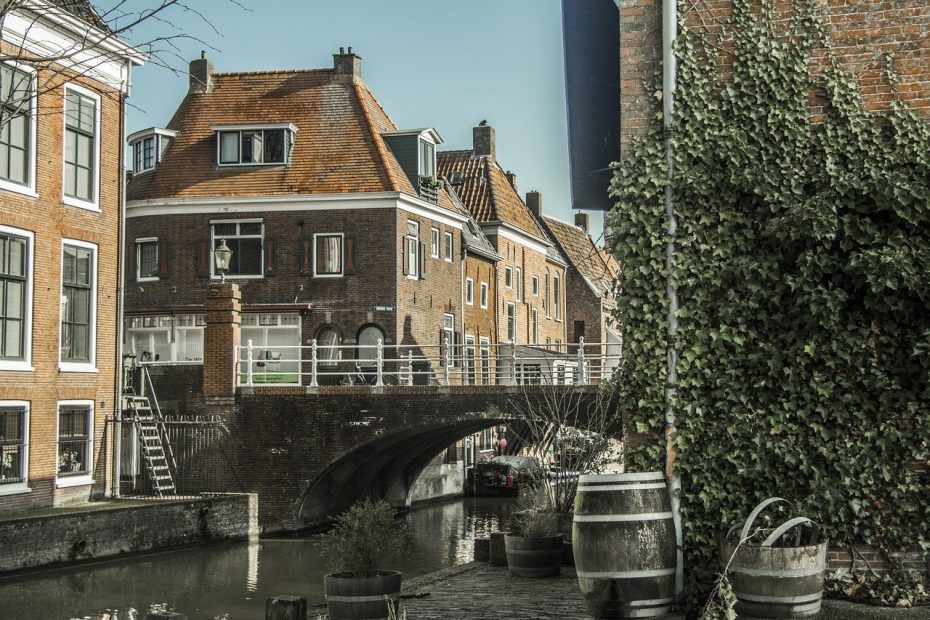Studying abroad is an excellent method to broaden your horizons and develop new skills. The Netherlands is an excellent choice for individuals considering studying abroad because it has so much to offer. Studying abroad does not have to be a stressful or overwhelming experience. This comprehensive guide to the Dutch university system covers everything an international student should know before enrolling in a university or program in the Netherlands.
This article will educate you on all you need to know about studying in the Netherlands, from fees and prerequisites to the application process and student lifestyle.

An Overview of the Netherlands
The Netherlands is a small country in Western Europe with a dense population, It is bounded to the east by Germany; to the south by Belgium, and to the southwest by France. Its maritime borders are shared with Belgium, Germany, and Denmark. Since 1815, the Netherlands has operated a constitutional monarchy, and since 1848, it has been a parliamentary democracy. The country is regarded as one of the most stable democracies in Europe and one of the most developed in the world.In worldwide measures of national performance such as economic competitiveness, human development, quality of life, public education systems, and happiness levels, the Netherlands ranks among the top.
Dutch is the official language of the Netherlands, and it is spoken by about 25 million people throughout the country. For international students, studying in the Netherlands is a fantastic opportunity. The Dutch educational system is regarded as one of the greatest in the world, and studying there will provide you with a solid basis for your future profession.
Why Should You Study Abroad in the Netherlands?
There are many reasons you should consider studying in the Netherlands. Because it has so much to offer, the Netherlands is an ideal place to study abroad.
The following are ten reasons you should study in the Netherlands:
- The Netherlands is a lovely country with numerous historical sites and museums to visit.
- You will become fluent in Dutch if you study abroad in the Netherlands.
- The Dutch are extremely warm and inviting to strangers.
- Studying Abroad in the Netherlands will allow you to travel throughout Europe.
- Studying in the Netherlands will help you in developing soft skills such as independence and adaptability.
- There are many chances for students who wish to work while studying.
- Studying Abroad in the Netherlands will enhance your CV.
- It is affordable to study in the Netherlands.
- It has one of Europe’s best healthcare systems.
- The Netherlands features some of Europe’s greatest institutions and education systems.
The Dutch Education System
The Netherlands offers one of the world’s greatest education systems. Students are entitled to free education until they reach the age of 18. They also have access to low-cost higher education that is free of tuition. There are three stages of education in the Dutch school system: primary, secondary, and tertiary (college/university). Children aged 4 to 12 attend primary schools, and children aged 12 to 18 attend secondary schools.
Tertiary education, often known as college/university education, includes vocational training programs as well as university programs. The Dutch culture is accepting and tolerant of different cultures and religions. Universities of professional tertiary education (universiteiten) and research universities (universiteiten) are the two categories of higher education institutions in the Netherlands (hogescholen). These colleges offer students three different types of degrees: a bachelor’s degree, a master’s degree (the doctorandus, or Drs., in Dutch), and a doctoral degree.
Programs that are more general and academically focused are offered by research universities. Wetenschappelijk onderwijs, or WO in short, is the name of this research-focused education in the Dutch language. Hoger Beroepsonderwijs, or HBO in Dutch, is an abbreviation for higher professional education provided by tertiary institutions (hogescholen). HBO programs are more practical and prepare students for a particular field.
Amsterdam bachelor’s degree program
This is a student’s first academic degree, hence they must have at least a Dutch VWO-diploma or a foreign equivalent, such as a high school diploma or certificate of secondary education, in order to be admitted. The Bachelor’s typically requires three years to complete and has 180 ECTS (European credit points, plus a credit representing 28 hours of full-time studying). The 240 ECTS professional higher education (HBO) programs are completed in four years. A Dutch HAVO, or professional secondary education diploma, is the bare minimum prerequisite for HBO programs.
Amsterdam master’s degree program
This degree, which comes after the bachelor’s, consists of coursework, occasionally an internship, and certainly a thesis. It takes one to two years to finish the degree. A Bachelor’s degree is required, preferably in a subject area connected to the Master’s program. The Doctoraal (abbreviated Drs.) is the Dutch term for a master’s degree; it should not be confused with a doctoral degree (a PhD). For a one-year program, the Master’s typically comprises of 60 ECTS (European credit points), and for a two-year degree, 120 ECTS. Numerous universities in Amsterdam also grant Master’s degrees with a more pragmatic focus.
Study for doctorates in Amsterdam
The candidate must hold a Master’s degree in a relevant discipline in order to pursue a doctorate. A doctorate often requires four years or more to complete, and it entails independent research and dissertation writing. An open defense of the dissertation follows. The dissertation can often be written in Dutch, English, German, or French; other languages call for special authorization. The Universiteit van Amsterdam and the Vrije Universiteit in Amsterdam both offer doctoral programs.
Students pay a little over 2,000 euros a year for tuition and HBO, with first-year students paying half of that amount. Higher education is state-funded. One of the steps the government has taken to address the nation’s teacher shortage is to require prospective teachers to pay half of their tuition during the first two years of their program. A study stipend may also be available to students, depending on their grades and their parents’ financial situation.
Increasingly more universities Studies from HBO and MBO are available in English. You can complete a colloquium doctum with a university once you become 21. This test is for candidates who can demonstrate that they are academically qualified but lack the necessary VWO or HBO diploma to enroll in higher education. Many colleges and universities also provide part-time study options so that students can balance schoolwork with work or other obligations. For additional information, see our guide to Dutch universities.
What are the Requirements for Studying in the Netherlands?
The following are the requirements for studying in the Netherlands:
- The Dutch government recognizes a high school diploma.
- A university degree or a vocational diploma from an international institution of higher education.
- A current visa.
- A permit to live in the country.
- Health-care coverage.
- Also, you may be required to complete a Dutch language exam.
Best Institutions in the Netherlands
The Netherlands, one of the first nations in continental Europe to introduce English-taught courses, has some of the oldest universities in the world. It has also recently drawn attention for its highly regarded and esteemed medical, engineering, law, and business schools. Numerous institutions and universities throughout the Netherlands have a solid international reputation for science and technology as well as research. This is a list of the best universities to study in the Netherlands, with rankings based on a variety of factors such as education quality, reputation, and amenities provided, among others.
1. University of Groningen
The Institution of Groningen is a public research university in the Dutch city of Groningen. It was founded on February 16, 1614, and is one of the oldest institutions in the Netherlands. The University of Groningen has about 26,000 students and 6,000 staff members. The university consists of seven faculties and 190-degree programs in areas like the arts and humanities, social sciences, and economics. Tuition fees differ according to nationality and degree length. Bachelor’s degree courses cost €10,000 per year for international students (excluding tuition fees for the first year).
2. Wageningen University
Wageningen University is a public university in the Netherlands. It was founded in 1877 and is one of the Netherlands’ oldest institutions. It provides courses in a wide range of areas, including medical sciences, engineering, economics, and social sciences, as well as life sciences and spatial planning. The university is also well-known for its international outlook and emphasis on sustainability. Times Higher Education Ranking 2018 has classified Wageningen University as one of the finest universities in Europe and number one in the Netherlands.

3. University of Amsterdam
The Institution of Amsterdam is a public research university in Amsterdam, the Netherlands. It is one of the oldest universities in the Netherlands, having been created by municipal authorities in 1632. The University of Amsterdam grants bachelor’s, master’s, and doctorate degrees. Humanities, Social and Behavioural Sciences, Economics and Business, Law, Science and Engineering are the university’s six faculties. It has over 25000 students from over 150 countries globally. Undergraduate degree tuition is €6,000 per year. Tuition for graduate degrees is €7,000 per year. International students with exceptional Dutch language skills and strong grades are eligible for scholarships at the institution.
4. Leiden University
The Institution of Leiden is a public research university in Leiden, Netherlands. It is one of the oldest universities in the Netherlands, having been founded in 1632. Humanities, Law and Social Sciences, Economics and Business, Science and Engineering, Medicine, Veterinary Medicine, and Biomedical Sciences are the seven faculties at Leiden University. Bachelor’s, master’s, and doctorate degrees are available at the university (PhD). The institution provides several courses, and the tuition rate may vary depending on whatever course you pick. Scholarships are also available for international students who wish to study at Leiden University.
5. University of Twente
Twente University is a university in the Netherlands. It was established in 1961 and has about 20,000 students. This university has a wide range of faculties. With nearly 6,000 students, the Faculty of Engineering and Technology is one of the most popular faculties. With about 5,000 students enrolled, the Faculty of Applied Sciences is likewise quite popular.
Over 4,000 students are enrolled in the Faculty of Economics and Business Administration. Other faculties include Humanities and Social Sciences, as well as Arts and Culture Studies. Dutch and EU students pay €2,060 per year in tuition, while overseas students pay €4,320. Tuition rates are among the lowest in the Netherlands, making them affordable to many students.
6. Utrecht University
Utrecht University is the country’s oldest. It was established in 1636 and is well-known for providing high-quality education and research. It has a strong tradition of teaching, research, and knowledge transfer excellence. Since its founding, the institution has been involved in international cooperation. Utrecht University strives to strike a balance between academic excellence and societal and industrial relevance. It has a worldwide perspective while maintaining a strong Dutch identity. Tuition fees can be a significant financial burden for many students around the world. The University of Utrecht has a scholarship program that makes studying abroad more affordable and accessible by reducing tuition fees.
7. Erasmus University Rotterdam
Erasmus Institution Rotterdam is a public research university in the Dutch city of Rotterdam. Johan Rudolph, the Dutch Minister of Internal Affairs at the time, founded Erasmus University Rotterdam. It was founded in 1913 and has been in existence for over a century. It is one of the oldest universities in the Netherlands, with a diverse range of academic programs, and is ranked among the top 100 institutions in the world by Times Higher Education. Erasmus University Rotterdam’s tuition fees are €5,000 per year for EU nationals and €6,000 per year for non-EU citizens.
8. Radboud University
Radboud Institution is a public university with a strong research emphasis. It was established in 1957, with its main campus in Nijmegen. With around 20,000 students and 4,000 staff members, Radboud University is one of the major universities in the Netherlands. The institution confers bachelor’s, master’s, and doctorate degrees in a variety of fields of study. Radboud University provides a diverse selection of courses ranging from the humanities to the sciences. Undergraduate tuition is €3,060 per year for EU students and €4,030 for international students.
9. Delft University of Technology
The Delft University of Technology is the world’s only university that provides a Master’s degree in Robotics and Artificial Intelligence. This Master’s degree program focuses on the design, analysis, and implementation of intelligent systems. The program is a great place to start if you want to work in research, industry, or education. A Bachelor’s degree in Robotics and Artificial Intelligence is also available at the Delft University of Technology. For students with a background in engineering or science, this curriculum gives a broad introduction to robotics and artificial intelligence. In Delft university, residents pay a tuition charge of €7,500. Tuition for EU students is €8,500, while tuition for non-EU students is €10,500.
10. Tilburg University
It is a Dutch university that specializes in Economics, Law, and Social Sciences. Tilburg University was established in 1976. It is one of the largest universities in the Netherlands, with students from all over the world attending. The institution boasts a vibrant student life, with over 500 international clubs and societies available to students. Tilburg University’s library is accessible 24 hours a day for students who need to study or work late. There are also numerous study areas where people can work on their tasks individually or in groups.
The Dutch University Admissions Process
The Dutch university admissions process is a complicated and competitive procedure with numerous steps.
The first step is to decide the university you wish to apply to. You can accomplish this in two ways: by picking an institution from the list provided or by entering your preferences. Following that, you must complete an application form for each preferred program and submit it by the deadline. This is normally done online, on their website or at your nearest embassy. The next stage is to await the admissions committee’s decision before accepting or declining their offer. If you are accepted, you can enrol at their preferred university and begin your studies there.
Scholarship offers for International Students in Netherlands
There are several scholarships available in the Netherlands, some of which are funded by the government. The good thing is all international students are eligible for these scholarships regardless of the school they are studying or the countries they come from. As long as you qualify for these scholarships, you can apply. Scholarships may be awarded by the government, colleges, or individuals. Scholarships are classified into three types:
- Merit-based.
- Need-based.
- Talent-based.
Merit-Based Scholarships: This is the most common sort of scholarship available today; it is provided based on the student’s academic achievement and achievements in extracurricular activities.
Need-Based Scholarships: These scholarships are provided based on financial need for education; they are usually offered by private entities, although some universities do as well.
Talent-based Scholarships: Talent-based scholarships are given to students who demonstrate remarkable abilities and attributes.

How to Apply for a Student Visa For The Netherlands
Students who wish to study in nations such as the Netherlands can apply for student visas. There are various types of student visas, and each one has a varied duration. The first step is to contact the Dutch embassy or consulate in your area. They will then be able to advise you on which form of visa is best suited to your needs and what documents you will require to apply for it. They will also be able to advise on any additional requirements, such as medical insurance. The second stage is to gather all of the required documents, which include the following:
- A valid passport, as well as a copy of it.
- A valid residence permit or evidence that you have applied for one. If your residence card was issued by a Dutch municipality, you can also present it.
- Proof of enrollment in a Dutch educational institution, such as an acceptance letter or enrollment form. This must be translated into Dutch and legalized by your home country’s Ministry of Foreign Affairs.
- Evidence proving you have enough money to support yourself while studying in the Netherlands.
- A letter from your parents expressing their support for your plan to study abroad.
The final step will be to submit these documents either online, at the embassy, or wherever the embassy directs you to do so.
Post Study Opportunities For Graduates in the Netherlands
There are several different post-study opportunities in the Netherlands. Several colleges provide courses for diploma-holding international students. Graduate programs are available at these educational institutions. International students can pursue their interests and gain expertise in several disciplines through post-study options in the Netherlands.
Final Note
We hope you found reading about studying in the Netherlands interesting. Regarding making a big decision like where you want to study or work, it’s critical to do your research and locate the best option for you and we are glad that we came up with this blog post to find answers to numerous questions that may be bothering you about studying abroad in Netherlands.
Thank you very much for taking the time to read this!
